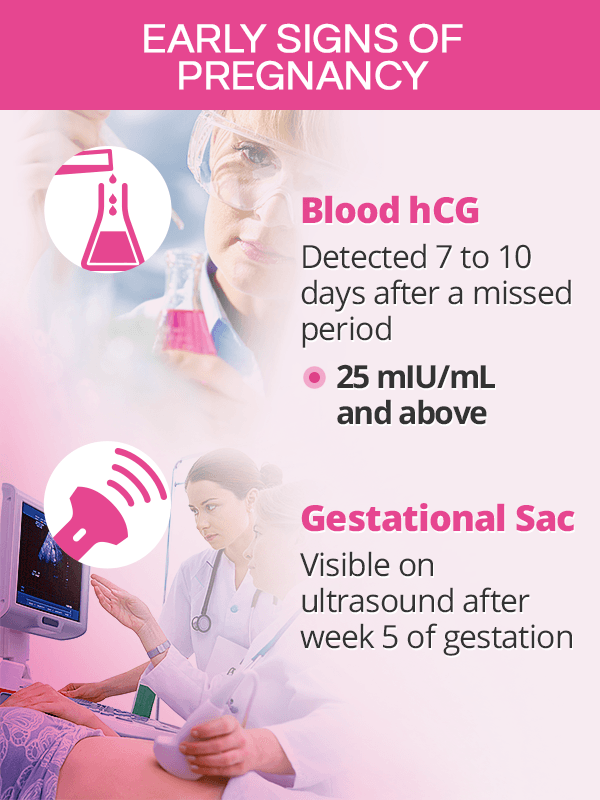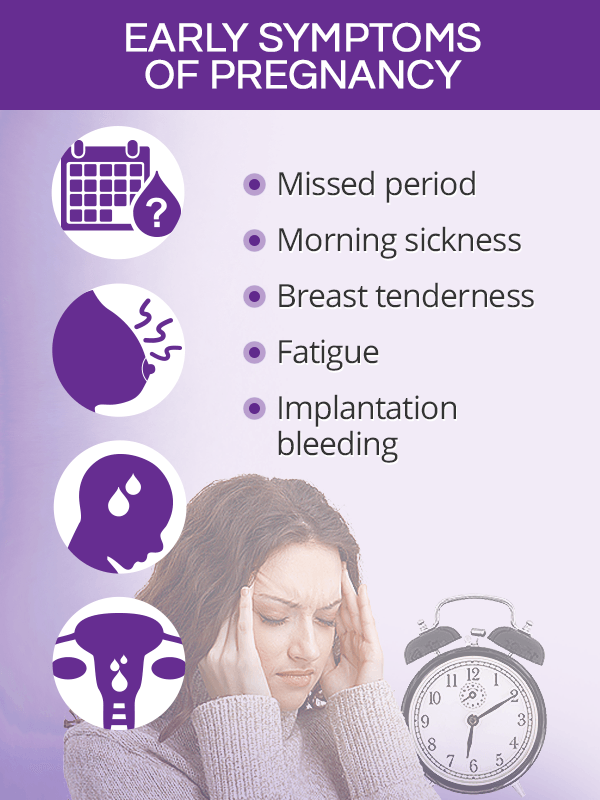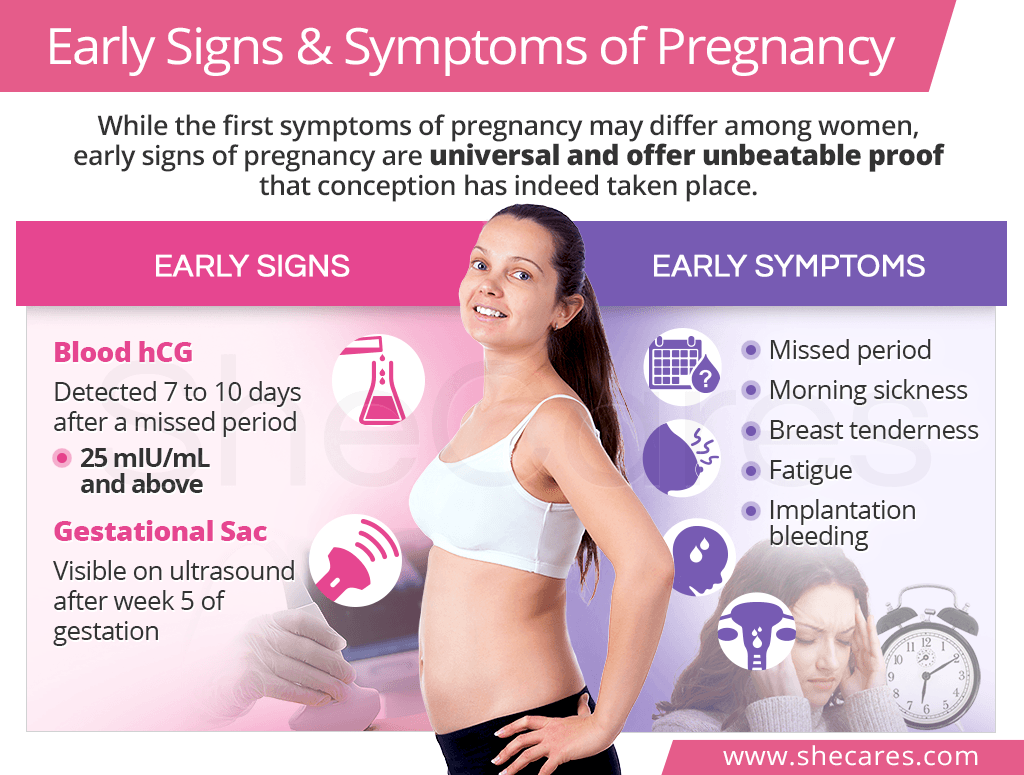Early Signs of Pregnancy

Unlike subjectively reported symptoms of pregnancy, early pregnancy signs are objective measurements obtained with the help of pregnancy tests or other diagnostic tools and interpreted by a medical professional.
Two most important first signs of pregnancy include the following:
Human Chorionic Gonadotropin (hCG)
The main sign of early pregnancy is the presence of a hormone, hCG, which is only produced once a fertilized egg implants itself in the uterine lining, called the endometrium. About seven to twelve days later, the presence of hCG can be detected through urine or blood test, but its exact levels can only be obtained through a quantitative hCG blood test.
- hCG levels 25 mIU/mL and above are a positive confirmation of pregnancy
- hCG levels that range from 6 to 24 mIU/mL require a repeat of the pregnancy test
- hCG levels 5 mIU/mL and less mean a woman is not pregnant
Gestational Sac in Early Pregnancy
Another early pregnancy sign is the presence of the gestational sac and subsequent anatomical structures that develop within it. They can be seen through a transvaginal ultrasound, which is performed when hCG levels exceed 1,500 - 2,000 mIU/mL, unless a woman has a history of ectopic pregnancy, in which case it can be done sooner.
- Gestational sac, a fluid-filled cavity enclosing the developing embryo, should be visible around week 5.
- Yolk sac, a structure within the gestational sac that provides nutrients, is visible around 5 ½ weeks.
- Fetalpole, the first sign of a growing embryo, is visible around 6 weeks viatransvaginal and 6 ½ weeks with abdominal ultrasound.
- Fetal heartbeat can be detected between the sixth and the eight week of early pregnancy.
Early Symptoms Of Pregnancy

Although the very first symptoms of pregnancy can appear as early as the time of implantation, the majority happen around week 4 and 6 of gestation. Until implantation, the body does not know yet that conception has occurred.
The most common early pregnancy symptoms include the following:
Implantation Bleeding in Early Pregnancy
The very first symptom of pregnancy some women observe is implantation bleeding, consisting of light spotting. After being fertilized on ovulation, the egg travels down to the uterus to implant itself in its wall, which occurs 6 to 12 days after fertilization. However, many women mistake implantation bleeding for their period.
Missed Period in Early Pregnancy
After implantation, the body immediately starts producing hCG, which signals the ovaries to stop maturing eggs and triggers other hormones, estrogen and progesterone, to prepare the body for supporting the embryo. Consequently, a woman will not get her next period, which is the most common of all early pregnancy symptoms. After that missed period, a pregnancy test will show high hCG levels within seven to ten days.
Morning Sickness in Early Pregnancy
One of the most notorious symptoms of early pregnancy is morning sickness, which - despite its name - can happen at any time during the day or night. Nausea with or without vomiting can start between the second and eighth week and often compromises a woman's nutrition in the first trimester.
Breast Tenderness in Early Pregnancy
Massive hormonal changes can also bring about certain early pregnancy pains, most commonly in the breasts. Tender, swollen, and sore breasts in early pregnancy usually reach their peak in the first few weeks, after which they will be less tender, but will continue to grow and change in preparation to nurture the baby.
Fatigue in Early Pregnancy
Fatigue can also be one of the first symptoms of pregnancy, which can appear as soon as a few days after conception. It can also be accompanied by insomnia, or sleeping problems. Although extreme tiredness in early pregnancy usually lessens during the second trimester, most women struggle with it anew as they enter their last months of pregnancy.
Other Early Pregnancy Symptoms
Other common early symptoms of pregnancy include increased flatulence, headaches, mood changes, frequent urination, sensitivity to smell, and food cravings or aversions. Some of them lessen as pregnancy progresses, while others might increase in their severity and frequency.
Key Takeaways
The first several weeks of pregnancy are characterized by rapid hormonal changes as the body prepares the right conditions for the developing embryo. These shifts bring about various discomforts, which often serve as the initial pregnancy confirmation. There are two main early signs of pregnancy, including the presence of the hCG hormone, which can be detected in urine or blood about seven to ten days after a missed period, and the evidence of the gestational sac on a transvaginal ultrasound around week five of gestation. When it comes to the first symptoms of pregnancy, although some women might experience bleeding around the time of implantation, all will miss a period once the embryo is embedded in the uterus. Other most frequently reported symptoms of early pregnancy include morning sickness, breast tenderness, and fatigue, some of which may last throughout the pregnancy or only during the elementary stages.
Sources
- American Pregnancy Association. (2018). Human Chorionic Gonadotropin (HCG): The Pregnancy Hormone. Retrieved April 24, 2019 from https://americanpregnancy.org/while-pregnant/hcg-levels/
- American Pregnancy Association. (2018). Pregnancy Symptoms – Early Signs of Pregnancy. Retrieved April 24, 2019 from https://americanpregnancy.org/getting-pregnant/early-pregnancy-symptoms/
- Better Health Channel. (n.d.). Pregnancy – signs and symptoms. Retrieved April 24, 2019 from https://www.betterhealth.vic.gov.au/health/healthyliving/pregnancy-signs-and-symptoms
- Eunice Kennedy Shriver National Institute of Child Health and Human Development. (2017). What are some common signs of pregnancy? Retrieved April 24, 2019from https://www.nichd.nih.gov/health/topics/pregnancy/conditioninfo/signs
- Medline Plus. (2019). Pregnancy. Retrieved April 24, 2019 from https://medlineplus.gov/pregnancy.html
- Office on Women's Health. (n.d.). Stages of Pregnancy. Retrieved April 24, 2019 from https://www.womenshealth.gov/pregnancy/youre-pregnant-now-what/stages-pregnancy
- UT Southwestern Medical Center. (2018). Patience is key: Understanding the timing of early ultrasounds. Retrieved April 24, 2019from https://utswmed.org/medblog/patience-key-understanding-timing-early-ultrasounds/
